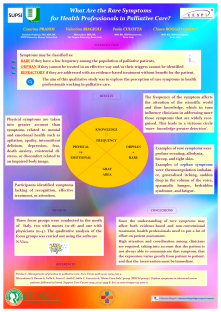What are the rare symptoms for health professionals in palliative care?
Autori
Description
Symptoms may be classified as ‘rare’ if they have a low frequency among the population of palliative patients, ‘orphan’ if they cannot be treated in an effective way and/or their triggers cannot be identified, and ‘refractory’ if they are addressed with an evidence-based treatment without benefit for the patient. The aim of this qualitative study was to explore the perception of rare symptoms in health professionals working in palliative care. Material and method. Three focus groups were conducted in the north of Italy, two with nurses (n=18) and one with physicians (n=4). The qualitative analysis of the focus groups was carried out using the software N-Vivo. Results and discussion. Participants believed that the frequency of the symptom affects the attention of the scientific world and thus knowledge, which in turn influence clinicians in addressing more those symptoms that are widely recognised, in a virtuous circle ‘more knowledge-greater detection’. Participants identified symptoms lacking of recognition, effective treatment, or attention. Examples of rare symptoms were profuse sweating, allodynia, hiccup, and tight skin. Examples of orphan symptoms were thermoregulation imbalance, generalised itching, sudden drop in the volume of the voice, spasmodic hunger, bedridden syndrome, and fatigue. In addition, participants reported that physical symptoms are taken into greater account than symptoms related to mental and emotional health such as agitation, apathy, intermittent delirium, depression, fear, death anxiety, existential distress, or discomfort related to an impaired body image. Conclusion. As the understanding of rare symptoms may affect the treatment, both evidence-based or non-conventional, health professionals need to put a lot of effort on patient assessment. High attention and coordination among clinicians are required, taking into account that the patient is not always able to communicate that symptom, that the expression varies greatly from patient to patient, and that the intervention must be immediate



